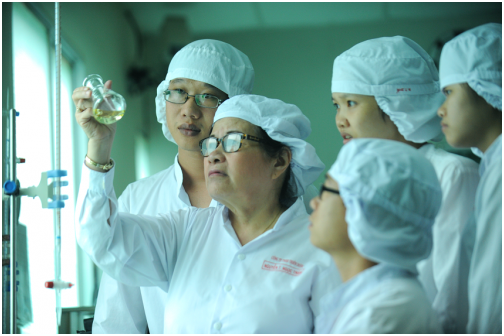Mentioning Dr.-Pharmacist Nguyen Thi Ngoc Tram, Director of Thien Duoc Limited Company, people at once think of an enterprise-spiritual scientist with plenty of success from scientific research.
Especially, the successful implementation of the project “Improving technological process of manufacturing hard capsule Crila® to meet export demand” approved by the Ministry of Science and Technology has successfully produced Crila forte treating uterine fibroid for export to the U.S. market.
The reporter has had an interview with Dr.-Pharmacist Nguyen Thi Ngoc Tram on the success of the project and difficulties in the enterprise’s scientific research.
How do you evaluate the role of the enterprise in investment for research and product commercialization?
Dr.-Pharmacist Nguyen Thi Ngoc Tram: In my opinion, the enterprise wanting to get sustainable development needs to focus a portion of funding set aside for research and commercialization of research products. From that, there will be a basic for the enterprise to be supported by the State, for further and more intensive research, creating a stable life for staff and workers and developing the enterprise, contributing to the country’s economic development.
Thien Duoc Co., Ltd. is a scientific and technological enterprise in Binh Duong province. This is also an enterprise which is initially successful from research results, having products for domestic market, contributing to protection of people’s health and initially being exported to the demanding U.S. market. Although the export volume is not so high, it has shown the quality of Crila forte created from research and production, as well as technical and technological level of the enterprise.
How has the enterprise invested in scientific research and how is the result obtained, madam?
The scientific and technological enterprise Thien Duoc has invested in scientific research, one of the scientific subjects/projects conducted to be probably mentioned is KC.06.DA14/11-15 “Improving technological process of manufacturing hard capsule Crila forte to meet export demand” with the total cost for project implementation of 20.5 billion VND, with self-funding of 14.4 billion VND.
The project has created 15 million capsules of Crila forte serving domestic market and export to the U.S. market with three products Crila for Menopause (blood regulation), Crila Uterine Health (uterine fibroids), Crila for Prostate (BPH). Total sales revenue of the products is 16.7 billion VND, of which 5.3 billion VND coming from export.
The project has completed technological process of extraction and production of dried extracts with total alkaloid content ≥ 0.50%, so equal to 2.5mg alkaloid per capsule and patients only have to take half quantity of capsules, previously 8 capsules for benign prostatic hyperplasia (BPH) and 10 capsules for uterine fibroids, now only 4 capsules and 5 capsules respectively.
In addition, the project has also completed technological process of manufacturing Crila forte 500mg capsule, establishing and evaluating the basic criteria of Crinum latifolium L. leaves as herbal materials, Crinum latifolium L. dried extracts, Crila forte capsule with standard substances crinamidine and 6-hydroxypowelline.

Dr.-Pharmacist Nguyen Thi Ngoc Tram along with her colleagues in the laboratory
Through the project, a plant patent which is valid for 20 years from 2015 has been registered in the Department of Crop Production - Ministry of Agriculture and Rural Development of Vietnam.
In your opinion, when engaging in research subjects/projects, what difficulties does the enterprise encounter? What recommendations and suggestions do you have to the authorities on remuneration policy for the enterprise participating in research?
Dr.-Pharmacist Nguyen Thi Ngoc Tram: When engaging in the research subjects/projects, financing is the biggest difficulty the enterprise encounters, counterpart fund accounts for 2/3 of the total implementation cost calculated as cash contributions to buy machinery or raw materials used for research. My recommendation is the counterpart funding is only 1/3 of the total cost for project implementation.
In Vietnam, there have not been so many specific policies to encourage scientists to focus on research. Many research projects have highly applicable products but still face difficulty in the process of transferring to serve the community. Vietnam has not established a group of companies who specialize in contacting and transferring research results of the scientists that in fact not all scientists have enough financial capacity to do so.
If there is a mechanism to encourage, support and manage properly, Vietnam will be more proactive in manufacturing and supplying medicines for domestic market at low price, helping to reduce cost for patients.
Thank you, madam!
Article, courtesy: Hoang Anh